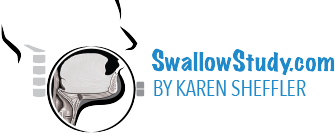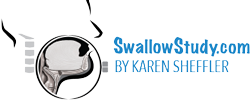Help Define the Dysphagia Evaluation
 By guest student bloggers: Jillian DiTota, BS & Victoria Abolafia, BA
By guest student bloggers: Jillian DiTota, BS & Victoria Abolafia, BA
Graduate Students from Southern Connecticut State University
Authors of the Survey: Clinical Preferences and Practices of Speech-Language Pathologists for Swallowing Evaluation
(Blog edited by Karen Sheffler, MS, CCC-SLP, BCS-S of SwallowStudy.com)
Introduction to Evidence-Based Practice
Our first ever Communication Disorders lecture in college was structured around “Evidence-Based Practice” and its immense significance. The professor couldn’t stress enough the huge role that research plays in guiding our care for people who have difficulties communicating and/or swallowing. Evidence from the literature is crucial, whether we are working with voice, speech, language, or cognitive issues or performing a swallowing evaluation (aka, dysphagia evaluation) or treatment session.
It seemed poetic: Delicately reported data made widely available for SLPs to help those in need.
It made us sound like superheroes, and it sparked our interest!
The idea of adding to this body of evidence to support patients from a distance was what inspired us to choose this research path in our graduate program. We were enticed with the idea that our work will not only help patients, but also it will help fellow clinicians. This is something that is not directly taught in graduate school.
Background of Our Work
Our background research began by reading as many articles as possible, including the work of our supervisor, Dr. Heather Warner Ph.D., CCC-SLP (Assistant Professor at the Department of Communication Disorders at Southern Connecticut State University). We wanted our research to be as valuable to SLPs as the nurse-administered Yale Swallow Protocol. This is just one example of the beneficial literature to which our supervisor has contributed (1). We quickly learned of the enormous body of literature filled with valuable, inspiring, and important research. To narrow our area of interest, we focused on a specific aspect of speech-language pathology to which we wished to add.
As practicing clinicians, we strive to continuously re-evaluate our clinical practice to ensure that it is well aligned with what the current literature tells us about best practice. In 1999, Dr. Gary McCullough and colleagues surveyed practicing SLPs regarding their clinical practice in the area of swallowing assessment (2). His findings were instrumental in providing us with information about how SLPs were conducting swallowing evaluations at the time. It allowed clinicians to determine if what they were doing was supported by evidence in the literature or popular opinion. This desire to allow evidence to drive our practice should be something we are constantly striving for in our daily practice, particularly in the critical clinical area of the dysphagia evaluation (aka, swallowing evaluation or swallowing assessment).
The McCullough study provided important information for our field; however, we must realize that this research was published 18 years ago. New clinicians have entered the field, and a plethora of dysphagia evaluation research has since been published. Given the importance of this clinical question and continued relevance in our field, it is important for the data to be updated.
Why Should You Take Our Survey?
By participating in this survey (survey is no longer available), about your current clinical practice in swallowing evaluation (dysphagia evaluation), you will contribute to an in-depth review of how the literature compares to current clinicians’ preferences and practices. It takes 15-20 minutes to complete, and you will be contributing to valuable research and an eventual resource to guide our current clinical practice.
***
Thank you if you took the time to contribute to this important clinical question!
References:
- Warner, H. L., Suiter, D. M., Nystrom, K. V., Poskus, K., & Leder, S. B. (2014). Comparing accuracy of the Yale Swallow Protocol when administered by registered nurses and speech-language pathologists. Journal of clinical nursing, 23(13-14), 1908-1915.
- McCullough, G. H., Wertz, R. T., Rosenbek, J. C., & Dinneen, C. (1999). Clinicians’ preferences and practices in conducting clinical/bedside and videofluoroscopic swallowing examinations in an adult, neurogenic population. American Journal of Speech-Language Pathology, 8(2), 149-163.
Read More:
Blog: SLP as Agent of Change at #ASHA16 (blog inspired by an interview with Dr Heather Warner)
Blog: Aspiration & Lessons from Steven Leder (covers Yale Swallow Protocol)

